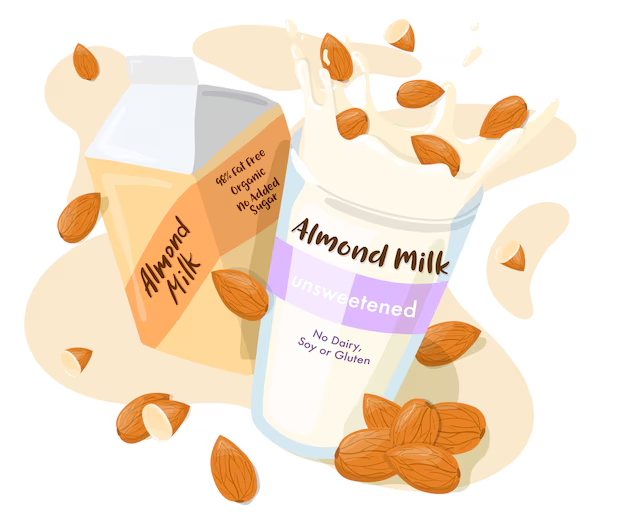Lactose intolerance affects millions of people worldwide, causing discomfort after consuming dairy products. With this condition on the rise, there’s been a growing demand for plant-based milk alternatives. Almond milk has emerged as a favorite choice among these options. But is almond milk good for lactose intolerance?
This article explores why almond milk is an excellent dairy substitute and the benefits it offers to those avoiding lactose.
Is Almond Milk Good for Lactose Intolerance?
Almond milk stands out as a fantastic option for individuals with lactose intolerance. Let’s dive into why this plant-based milk is ideal.
1. Lactose-Free and Dairy-Free
Almond milk is naturally lactose-free and free of any dairy components. This makes it a safe choice for those who can’t digest lactose, the sugar found in cow’s milk. Unlike some lactose-free cow’s milk, almond milk doesn’t require additional processing to remove lactose. Its natural composition makes it a go-to choice for individuals seeking a simple alternative.
2. Gentle on Digestion
For many people, consuming dairy leads to digestive issues like bloating, gas, or diarrhea. Almond milk, on the other hand, is easily digestible. It’s especially beneficial for individuals with sensitive stomachs who struggle with traditional dairy products. Its light texture and minimal fat content also contribute to easier digestion compared to full-fat dairy milk.
3. Free of Allergens for Some
In addition to being free from lactose, almond milk lacks the casein and whey proteins found in cow’s milk, which can trigger allergic reactions in some individuals. This makes it a versatile option not just for lactose-intolerant individuals but also for those with dairy protein sensitivities.
4. Versatile in Cooking and Baking
Almond milk isn’t just a replacement for drinking milk; it works seamlessly in recipes. Whether you’re making smoothies, soups, or desserts, its mild, nutty flavor enhances the taste without causing digestive discomfort.
Benefits of Almond Milk

Almond milk offers more than just relief from lactose intolerance. It’s packed with nutrients and provides a range of benefits. Let’s break down almond’s health benefits.
1. Nutritional Advantages
Almond milk is fortified with essential vitamins and minerals. It often contains calcium, vitamin D, and vitamin E, all of which support bone health and immunity. Its low-calorie count also makes it a popular choice for people watching their weight. Unsweetened almond milk typically has fewer calories than cow’s milk, making it a guilt-free addition to your diet.
2. Promotes Skin Health
The vitamin E in almond milk acts as a powerful antioxidant, protecting your skin from damage caused by free radicals. Regular consumption may help improve skin elasticity, hydration, and overall appearance.
3. Supports Weight Management
Almond milk is naturally low in calories and sugar, especially in its unsweetened form. Swapping it for high-calorie beverages can help reduce overall calorie intake, making it easier to maintain or achieve a healthy weight.
4. Heart Health Benefits
Almond milk is cholesterol-free and contains healthy fats, which support cardiovascular health. Its low saturated fat content can help manage cholesterol levels, reducing the risk of heart disease.
5. A Solution for Dietary Restrictions
Almond milk is an excellent alternative for individuals following vegan or dairy-free diets. It’s also gluten-free, making it suitable for those with gluten sensitivities or celiac disease.
Almond Milk Side Effects and Concerns
While almond milk offers numerous benefits, it’s important to consider its potential drawbacks. Here are some side effects and concerns associated with almond milk consumption.
1. Allergies to Almonds
Almond milk is derived from almonds, making it unsuitable for individuals with nut allergies. Allergic reactions may include itching, swelling, or more severe symptoms like difficulty breathing. If you’re allergic to tree nuts, almond milk should be avoided entirely.
2. Stomach Upset
Though almond milk is generally easy to digest, some individuals may experience mild stomach upset. This could be due to additives like carrageenan, which is sometimes used as a thickener. Always check labels to ensure your almond milk contains minimal additives.
3. Kidney Health Concerns
Almonds are naturally high in oxalates, which can contribute to kidney stone formation in susceptible individuals. Those with existing kidney issues or a history of kidney stones may need to limit their almond milk consumption.
4. Added Sugars and Preservatives
Flavored and sweetened almond milk varieties often contain added sugars, which can negate its health benefits. Preservatives and artificial flavorings in some brands may also be concerning for health-conscious consumers. Opting for unsweetened, organic almond milk can help minimize these risks.
5. Not for Infants
Almond milk should not be given to infants as a substitute for breast milk or formula. It lacks the necessary nutrients for proper growth and development in young children.
To Read: Monday Musings + Almond Butter, Banana, and Chocolate Panini
Comparing Almond Milk and Regular Milk

Understanding the differences between almond milk and cow’s milk helps highlight their suitability for various dietary needs.
1. Nutritional Differences
Cow’s milk is rich in protein, calcium, and essential vitamins like B12. Almond milk, while fortified with similar nutrients, naturally contains less protein. For individuals who need higher protein intake, cow’s milk may be a better option. However, almond milk is lower in calories and fat, making it ideal for weight management.
2. Lactose Intolerance vs. Dairy Consumption
For those who are lactose intolerant, almond milk is a lifesaver. Its lactose-free nature ensures that it doesn’t cause digestive discomfort. In contrast, regular cow’s milk is off-limits unless specially treated to remove lactose. This makes almond milk more inclusive for those with dietary restrictions.
3. Taste and Versatility
Almond milk has a distinct nutty flavor that complements smoothies, cereals, and baked goods. Cow’s milk offers a more neutral taste, which some people may prefer. Both have unique qualities, but almond milk stands out for those seeking plant-based alternatives.
To Read: Almond & Coconut Macaroon Granola
Alternatives to Almond Milk for Lactose Intolerance
Almond milk isn’t the only option for lactose-intolerant individuals. Here are some other excellent substitutes:
1. Soy Milk
Soy milk is another popular plant-based option. It’s packed with protein and fortified with calcium and vitamins. Its creamy texture makes it suitable for coffee, cooking, and baking.
2. Oat Milk
Oat milk is a fantastic choice for those looking for a creamy and slightly sweet alternative. It’s naturally high in fiber and fortified with essential nutrients like calcium and vitamin D. Plus, it’s often preferred for its neutral flavor.
3. Lactose-free cow’s Milk
Lactose-free cow’s milk is a great solution for individuals who prefer the taste and nutritional profile of dairy milk. It undergoes a process to remove lactose while retaining the same nutrients.
FAQs
1. What Are The Side Effects Of Almond Milk on Kidneys?
Almond milk contains oxalates, which can contribute to kidney stone formation in susceptible individuals. If you have kidney issues, consult your doctor before consuming almond milk regularly.
2. Can I Drink Almond Milk If I Am Lactose-Intolerant?
Yes, almond milk is lactose-free, making it an excellent choice for individuals who are lactose-intolerant or have difficulty digesting dairy products.
3. Does Almond Milk Upset Your Stomach?
For some, almond milk can cause stomach upset due to added thickeners or preservatives. If you’re sensitive, opt for unsweetened or natural almond milk versions.
4. What Dairy Is Good for Lactose Intolerance?
Lactose-free dairy products, such as lactose-free milk, hard cheeses (like cheddar), and yogurt with live cultures, are generally suitable for lactose-intolerant individuals.
Conclusion
So, is almond milk good for lactose intolerance? Absolutely. Its lactose-free nature, ease of digestion, and versatile use make it an excellent choice for those avoiding dairy. While it has its drawbacks, such as potential allergies and added sugars, these can be managed by choosing high-quality, unsweetened options. For anyone looking to enjoy a plant-based lifestyle or manage lactose intolerance, almond milk remains a top contender.

